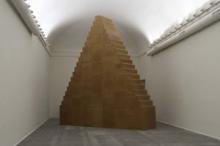Wolfgang Laib
dal 16/4/2007 al 8/6/2007
Segnalato da
Museo Nacional Centro de Arte Reina Sofía
16/4/2007
Wolfgang Laib
Museo Nacional Centro de Arte Reina Sofia, Madrid
Without Beginning, Without End

Without Beginning, Without End
Wolfgang Laib (Metzinger, Germany, 1952) began his art career in the mid-seventies, after taking a degree in medicine and practising as a doctor for a few years. Through belonging to a family that cultivated an exquisite asceticism and made frequent trips to India and other eastern countries, he became interested from a very early age in religion and mysticism, which led him to study oriental cultures and languages and find in art the means of knowing and expressing his vision of the world. Since then his work has been characterized by great formal purity and austerity. He uses natural materials with a strong symbolic and vital content unrelated to those generally found in art -beeswax, milk, pollen and rice- to create an encounter between art, nature and spirituality. His pieces are conceived as a ritual, an integral process linked to a cosmic order, to the mysticism of nature, which different cultures and religions have developed. In an attempt to preserve a sense of purity connected to natural order, each work follows a cyclical procedure which involves collecting the materials during specific seasons and in certain places, assembling them meticulously for exhibition in the manner of a liturgical celebration, their daily maintenance and, finally, recycling the elements of which they are made. A cyclical ritual in which each piece is renewed again and again, the circle widening with other new works as the years pass.
In contrast to their physical fragility, Laib’s works have lasting, eternal qualities. They allude to the transcendence and beauty of things at one and the same time simple and essential to everyday life. The influence of eastern philosophy and religion is evident yet
his work cannot be reduced to one clearly defined principle: it is also attracted to western mystical traditions, to the utopian aspects of avant-garde art and the formal features of the minimalist context -though with a metaphysical dimension.
In this exhibition Wolfgang Laib presents four of his most powerful and representative pieces, which, through being bearers of a cyclical and regenerative message, bestow an inaugural air on the rooms of the museum, a sensation that this is a site-specific exhibition.
Milkstone. Created in 1975, this work consists of a rectangular slab of white polished marble with a slight depression on the upper surface filled with a thin layer of milk creating the illusion of a solid form which later requires the almost ritual participation of daily maintenance. Laib carries out the first act of pouring on the milk when the work is installed, but after this initial gesture the museum staff are responsible for cleaning the stone and pouring on fresh milk every day.
Rice Meals. After his return from a trip to the east (China, Tibet, India...) in 1983, Laib began to use rice arranged on "thalí" -Indian plates normally used for eating and for presenting offerings at the shrines. This piece consists of a line of 33 brass plates with a small pile of rice on each. Offering and ritual order are present in this work, notable for its essentiality and simplicity.
There is No Beginning and No End, a six-metre-high ziggurat made with blocks of beeswax manufactured especially for this exhibition, continues the idea of elementary structures (of pure geometrical simplicity) with beeswax which Laib has been making since the early nineties. These pieces reflect his interest in an architectural kind of sculpture and incorporate the idea of stepped elevation inspired by ancient Mesopotamian constructions.
Pollen from Hazelnut Continuing this system of process and ritual, Laib gathers pollen during the spring and summer months in the fields around his house in the Black Forest in Germany. He keeps the pollen in simple glass jars and for the installation sprinkles it directly onto the floor, creating large squares of a fascinatingly intense colour.
Museo Nacional Centro de Arte Reina Sofia
Santa Isabel, 52 - Madrid
Hours: mon - sat 10-21; sun 10-14.30; closed on thursday.



